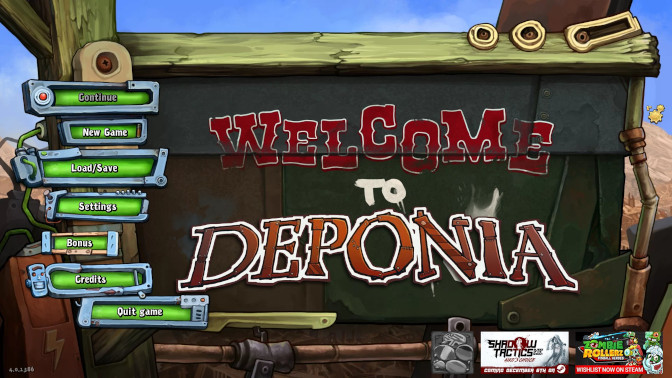|
Deponia
Year Published: 2012
Publisher: Daedalic Entertainment
Developer: Daedalic Entertainment
|
Despite carrying the "Hidden Object" tag on Steam, Deponia is actually a traditional point-and-click adventure game with a not-so-traditional story and characters. It is a game known for being a comedy, but as various reviews around the internet would imply, not everyone finds it funny. Unfortunately, I fall into that category, and I believe there are definitive reasons the sort of humor the game attempts just doesn't work here.
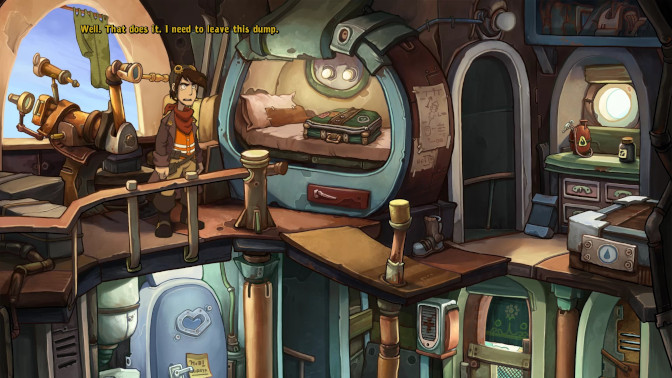
And so it begins...Rufus decides to leave a literal dump.
The story centers on Rufus, a slacker who looks like Shaggy from Scooby-Doo, but is dressed more like a Wacky Races contestant. Rufus is jobless and soon-to-be-homeless since his ex-girlfriend is throwing him out because he never does any laundry, dishes, or other chores. Instead, he spends his time planning ways to leave his home planet of Deponia for Elysium, a supposed "paradise" that is suspended high in the sky and ruled by a militaristic government called the Organon. Rufus is initially unaware of that second part and believes Elysium to be a place where he never has to have a job or do any chores and where he'll find himself an Elysium woman.
If it sounds like this is a case of the developers biting the hand that feeds them, that's because it probably is. I believe the intention was to be a parody of the "self-entitled" gamer type, as Rufus often gets comeuppance in the form of Looney Tunes-style bodily harm and trashtalk from other characters. But the caveat of parodies is that they often end up being indistinguishable from what they're making fun of. Sine I am playing as Rufus, I feel like I am supposed to sympathize with Rufus, and he is certainly not likable, but not entirely unjustified in wanting to leave Deponia, either.
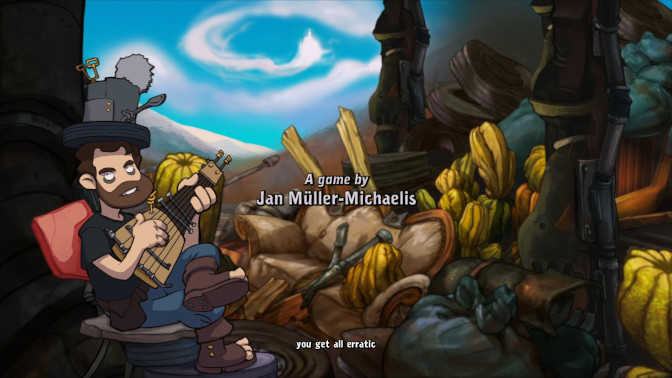
The narrator only appears to serenade between chapters.
Deponia, you see, is a desert planet covered in several layers of rusty metal junk. Despite being dotted with cacti, it has only one live tree remaining (which looks like it's about dead, of course). Rufus's hometown, Kuvaq, seems to have been built up out of a junkpile, in and around it as best as possible, and looks on the verge of collapse. All other places Rufus visits are lying in various stages of abandonment. Due to the skilled artistry in the backgrounds, there is a sort of eclectic beauty to it all, like a mix of Steampunk, Dystopia, and a Spaghetti Western. Each chapter even starts with a narrator and chorus who sing a preamble in the style of an Ennio Morricone song.
But a garbage planet with some cacti is still a garbage planet, and Rufus hates living there, and so does everyone else. It's clearly had an effect on the population. If there's any consolation in having to put up with Rufus's ego and attitude for the whole game it's that everyone around him is arguably worse. And that leads us to why the humor didn't work for me.
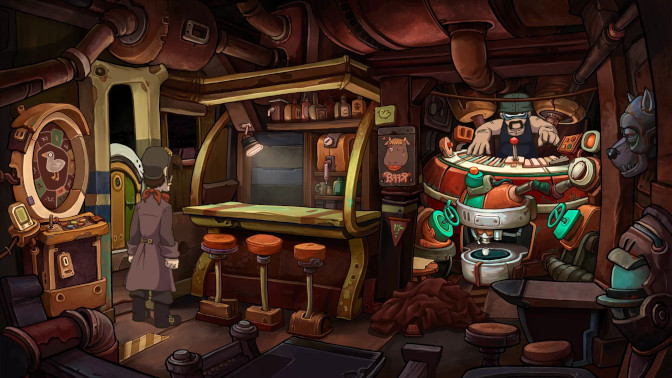
It's a nuclear powered espresso machine.
First of all, a character like Rufus needs a foil. Both his ex-girlfriend Toni and his diminutive neighbor Wenzel could've fit this role, but they both come across as grating. Other characters include Gizmo, who fills all three professions of Kuvaq's doctor, policeman, and fireman and looks like he hasn't slept since accepting them; Lonzo, a bartender who makes espresso with a nuclear-powered pipe organ; and a really aggravating robot postman. These characters are creative, certainly, but they don't generate laughs and are often just obstacles the player must overcome. Very longwinded obstacles.
Which brings me to my second reason: The dialogue is far too wordy. Simple scenarios have endless text, and if you don't peruse it, you might miss something that will progress the game. Combined with how long it can take to figure out the puzzles, it causes the story to feel like it's taking forever to get anywhere. It's very easy to forget what you're supposed to be doing when it's been so long since the story moved an inch forward. (Deponia was originally written in German, so I wouldn't be surprised if something got lost in translation, too.)
My third reason is an observation I've made about attempts at comedy in video games before: Certain forms of physical comedy depend highly on timing and the talent of the actor performing it. It is often very difficult to convey this in a video game. Even a competently-animated one like Deponia has its limitations. Take, for example, an early scene where Rufus tries to convince the villains he can outrun them by running around while making "whooshing" noises. This sounds funny on paper, and I can imagine a skilled actor like Jim Carrey or Steve Carell, or even a cartoon character like Freakazoid, pulling this off. But here, the scene falls flat because the timing and animation necessary to make it work aren't there.
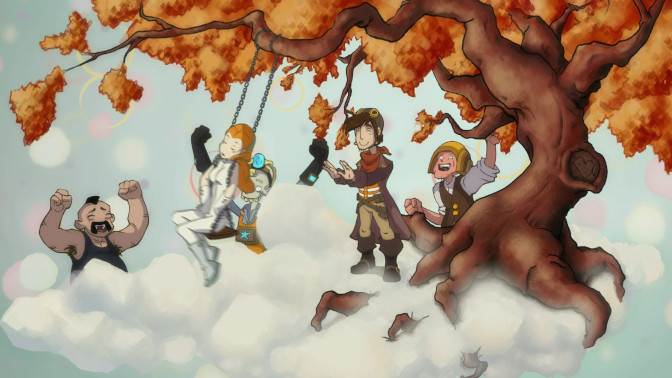
Girlfriend in a coma, I know it's serious.
Though the game is from the more naive era of 2012, I imagine some modern audiences may take umbrage with its treatment of women characters. Aside from Toni, the only other prominent female is an Elysian whom Rufus accidentally knocks off an Organon cruiser in his attempt to escape Deponia. I guess the difference between an Elysian and a human is that they are taller, lack a nose, and their memory is stored on a brain implant cartridge that is prone to malfunction. She lands unconscious and stays that way for most of the game. The one time I can remember laughing out loud was when Rufus began fantasizing about her, and she was still unconscious in the daydream as he pushes her limp body on a swing. But when Rufus begins dragging her around for real, the joke is no longer funny. Oh, and her name is Goal. Yes, Goal. Get it? I'm afraid so.

I'm sure this screenshot will bring back nightmares to anyone who's played this far.
Anyone familiar with classic point-and-click adventure games, particularly the Sierra and Lucasarts catalogs, is probably aware that their puzzles tend to be far more cryptic and complicated than the simplified designs of modern hidden object games. Deponia hearkens back to that old form, which some may welcome, but others may find a frustrating exercise in simply trying every item on everything and anything and repeating actions in hopes of different results. The only "hint" system comes in the form of using the Space Bar to highlight things you can interact with. Deponia even makes fun of a certain infamous Cat Hair Mustache puzzle, while retaining some obtuse conundrums of its own.
One particularly cruel example involves giving caffeine and sedatives to cats that lick postage stamps and homing pigeons that carry oversized mail packages. Even ignoring the obvious animal abuse here, this scenario is extremely difficult to piece together, and one component is solving a HOG-style spinning wheels puzzle that seems adamantly opposed to doing what you want it to do. It appears that only one very particular sequence of button presses from the start will solve it, so if you don't use a guide right away, I hope you can get the parts back to their original positions when you finally acquiesce.

I still hear that annoying cotton candy machine in my sleep.
Deponia is the first in a trilogy (and the series even got a fourth entry later), so the story ends abruptly and is unsatisfactory. It's a weird situation I find myself in, because I am slightly curious about what happens next, but I'm not exactly jumping headfirst into the sequels, either. The artistry, music, and voicework all show potential and talent from the devs. But dealing with a character like Rufus is very exhausting, and I need a break from him. At one point in the story I earned an achievement for "telling the truth". It was a situation where I thought that was the right thing to do, even though I don't believe it's what Rufus would've actually done.
SCORE: 2.5/5
|
